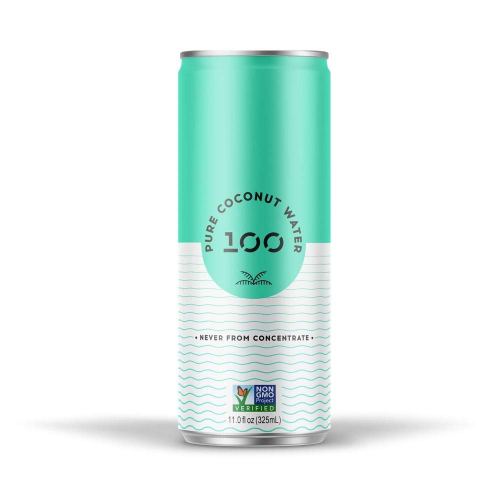Our editors independently select these products. Making a purchase through our links may earn Well+Good a commission
Ah, coconut water. It’s refreshing, super hydrating, and makes for a spa-worthy coconut cucumber cocktail or healthy sports drink alternative. While it’s undoubtedly delicious, that’s only the beginning of the numerous benefits of coconut water that make every sip oh-so-satisfying.
Experts in This Article
Philadelphia-based registered dietitian and the owner of Your Plant Based Baby
registered dietitian and certified personal trainer based in Richmond, Virginia
celebrity chef, certified nutritionist, and Reiki master
registered dietitian and author of The Better Period Food Solution.
If you’re considering adding coconut water to your daily routine, read on for everything there is to know about the nutrient-packed beverage, from how it can positively impact your well-being to the best options to stock your fridge with.
What is coconut water, exactly?
Not to be confused with coconut milk, coconut water is the juice found inside a coconut. While coconut water is mostly exactly that—water—coconut milk “is made by blending coconut meat with water,” says Serena Poon, CN, a chef and certified nutritionist. This mixture ends up being a much thicker consistency than coconut water.
Is coconut water good for you? Very. There also aren’t many side effects of coconut water to be aware of. If you look at the coconut water nutrition stats, here’s what you’ll find in a one-cup serving:
- Calories: 49
- Carbohydrates: 12 g
- Sugar: 11 g
- Calcium: 60 mg
- Potassium: 559 mg
- Sodium: 34 mg
Thanks to coconut water’s explosion in popularity in recent years (just like coconut sugar!), it’s easy to find at most grocery stores. That means reaping all the coconut water benefits is a breeze.
7 coconut water benefits you should know about
There are numerous benefits of drinking coconut water daily. Thanks to its fiber and magnesium, it supports healthy digestion, ensuring things stay moving. And because of its hydration powers and vitamin C content, there’s even coconut water benefits for your skin. So what are you waiting for? Here’s everything you should know before you start sipping.
1. It’s hydrating
Is coconut water hydrating? It sure is, all thanks to coconut water’s electrolytes, such as sodium, potassium, and magnesium. While electrolytes are great for everyday consumption (they help regulate your pH, keep you well-hydrated, and control muscle contractions), they’re especially helpful in certain situations. “Coconut water could be a good choice for rehydration after a long or intense workout, an illness during which you experience vomiting or diarrhea, or after a day out in the sun,” says Poon.
In fact, coconut water’s hydration powers make it excellent for when you’re sick, according to Tracy Lockwood Beckerman, MS, RD, a registered dietitian-nutritionist in New York City. “If you’re making a lot of trips to the bathroom or suffering from a fever, chances are you’re losing a lot of fluids. Drinking water will help, but you may continue to feel dehydrated until your electrolytes are fully replenished,” she previously told Well+Good in an episode of You Versus Food. That’s why she’s all about coconut water, which naturally contains more electrolytes than regular water.
2. It supports healthy digestion
Chugging enough water every day keeps everything moving along just dandy in your digestive system and allows nutrients to be absorbed into the bloodstream. Coconut water, though, takes things to the next level thanks to its fiber and magnesium content. (Surprised?) “Fiber is a crucial component of healthy digestion, as it helps move waste through your system,” says Poon. “Magnesium helps to relax your muscles and is often taken in supplement form to help relieve conditions like constipation.”
3. It supports healthy skin
Now onto the coconut water benefits for your skin. Keeping our bodies nice and hydrated doesn’t just support healthy organ function. It also supports optimal skin health. Regular H20 provides the same benefit, but with coconut water, you also get a small dose of skin-enhancing vitamin C—around 10 milligrams per 100 grams, according to the coconut water nutrition stats.
“Vitamin C has been shown to support collagen production, which can reduce the appearance of fine lines and wrinkles,” says Poon. “Coconut water isn’t going to be the magic bullet toward beautiful skin, but it certainly can help you cultivate beauty from the inside out.”
4. It’s good for your heart
By now you know that coconut water is a great source of potassium. That’s not only good news in terms of hydration, but it also directly benefits the cardiovascular system.
“Coconut water can help support heart health. Being a high-potassium beverage, it helps the body balance blood pressure levels,” says Brittnee Cannon, RDN, a Philadelphia-based registered dietitian and the owner of Your Plant Based Baby. “Many Americans tend to consume too much sodium and not enough potassium, so having a nutritious source of potassium helps promote healthy blood levels by lowering the effect of excess sodium.”
Past research has linked regular potassium consumption with a lowered risk of stroke and coronary heart disease. Considering heart disease is the number one cause of death in the United States, that’s a very good reason for drinking coconut water on the reg.
5. It may help lower cholesterol
Another reason why coconut water is good for cardiovascular health is that it may help keep cholesterol levels in check. One past study found this to be the case—at least in rats. More research needs to be done in order to confirm the connection in human health, but the results are promising.
6. It contributes to bone health
The calcium in coconut water is directly linked to helping keep teeth and bones strong, as up to 99 percent of calcium is stored in our bones. According to the Academy of Nutrition and Dietetics, adults ages 19 to 50 need at least 1,000 mg of calcium per day. One serving of coconut water has 60 mg, which isn’t a ton, but every little bit counts.
7. It helps prevent chronic inflammation
When the body experiences high levels of inflammation for a prolonged amount of time, it can lead to chronic disease and cognitive decline. Eating foods high in antioxidants helps mitigate this risk, and past research confirms you can add coconut water to your anti-inflammatory shopping list. Now that’s a coconut water benefit to get excited about.
“Coconut water contains antioxidants, which help to prevent and reverse damage in our body caused by our daily activities like eating, breathing, and exercising,” says Kaytee Hadley, MS, RDN, a registered dietitian based in Richmond, Virginia. “Diets high in antioxidants have been shown to help prevent many different chronic diseases, from cancer to diabetes.”
How much coconut water should I drink?
Clearly, coconut water makes a great companion to your regular water consumption. Like with most things, though, it’s absolutely possible to have too much of a good thing.
One such example: Is coconut water hydrating? Yes. But Poon points out that coconut water has about 50 to 60 calories per 8-ounce serving, so chugging it like you would good ol’ H20 all day long isn’t recommended. It also naturally contains some sugar, and some brands add even more to theirs, making it definitely not equivalent to drinking water.
So how much coconut water should you be drinking in order to reap the benefits without overdoing it? Whether you’re wanting to take advantage of coconut water’s electrolytes or skin-boosting benefits, Poon suggests sticking to one to two cups of coconut water per day at most.
Are there any side effects to drinking coconut water?
Sure, coconut water is good for you. But while this buzzy beverage is loaded with nutritional benefits, there are also some side effects of coconut water to be aware of.
For starters, over-consuming potassium can cause some digestive issues including diarrhea—not fun. “People with irritable bowel syndrome, small intestine bacterial overgrowth, or other gut conditions may be triggered by drinking coconut water because it is considered high-FODMAP,” says Hadley. “This means it contains specific types of carbohydrates that could aggravate bloating, gas, and stomach pain.”
According to Cannon, anyone with kidney issues should also limit their intake. “Those with kidney disease or any condition in which they need to watch their potassium levels should avoid drinking too much coconut water since it’s high in potassium,” she says.
The best coconut water to buy
There are a couple of things to keep in mind when shopping for coconut water. First, be sure to read the label to make sure there isn’t any added sugar. There’s really no need for that anyway; coconut water is already sweet enough on its own. Also, look for a product that’s pure coconut water—not something made from concentrate. “When brands add unnecessary sugars or source it from concentrate, the drink becomes more like another unhealthy fruit juice versus a nutritious water alternative,” says Cannon.
Below, find the coconut water brands that are free from added sugar and other additives, ensuring the coconut water is as nutritionally beneficial as possible.

100 Coconuts Pure Coconut Water (12-pack) — $24.00
This pick is pure coconut water. The only ingredient listed on the label is the coconut water itself, plain and simple. It’s also Non-GMO Project certified.
Pros:
Sign up for the Well+Good SHOP Newsletter
Get exclusive deals on wellness, beauty, fitness, and food products that have been hand-picked by our editors.
Got it, you've been added to our email list.











